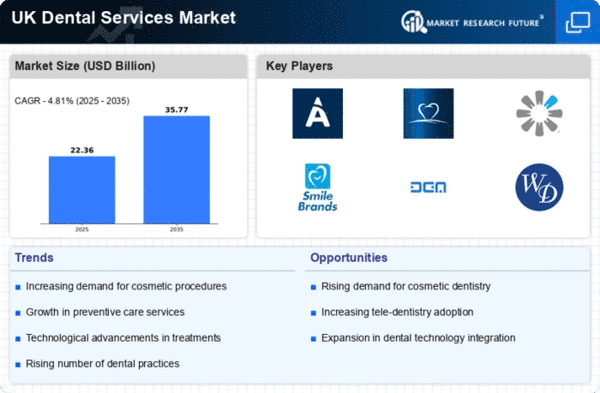Rising Disposable Income
The dental services market is benefiting from an increase in disposable income among the UK population. As economic conditions improve, individuals are more willing to invest in their oral health, leading to a surge in demand for both essential and elective dental services. Data indicates that households with higher disposable income are likely to spend approximately 15% more on dental care compared to those with lower income levels. This trend suggests that as financial stability continues to rise, the dental services market may experience sustained growth, with patients seeking advanced treatments and cosmetic procedures that were previously considered unaffordable.
Increasing Oral Health Awareness
The dental services market is experiencing a notable shift due to rising awareness regarding oral health among the UK population. Educational campaigns and public health initiatives have contributed to a greater understanding of the importance of regular dental check-ups and preventive care. This heightened awareness is reflected in the increasing demand for dental services, with a reported growth of approximately 5% in patient visits over the past year. As individuals become more proactive about their oral health, the dental services market is likely to expand further, driven by a population that prioritizes preventive measures and seeks professional dental care to maintain optimal oral hygiene.
Government Initiatives and Funding
Government initiatives aimed at improving oral health care access are influencing the dental services market. Recent policies have focused on increasing funding for dental services, particularly in underserved areas, which is expected to enhance service availability and affordability. The UK government has allocated an additional £50 million to support dental practices in providing essential services to low-income families. This funding is likely to stimulate demand within the dental services market, as more individuals gain access to necessary dental care. As these initiatives take effect, the market may see a rise in patient numbers and an overall improvement in public oral health.
Technological Advancements in Dentistry
Technological advancements are playing a pivotal role in shaping the dental services market. Innovations such as digital imaging, 3D printing, and tele-dentistry are enhancing the efficiency and effectiveness of dental care. These technologies not only improve patient outcomes but also streamline practice operations, potentially increasing patient throughput. Integrating such technologies is expected to drive market growth by approximately 7% over the next few years, as dental practices adopt these tools to meet the evolving expectations of tech-savvy patients. Consequently, the dental services market is likely to witness a transformation in service delivery and patient engagement.
Aging Population and Increased Dental Needs
The demographic shift towards an aging population in the UK is significantly impacting the dental services market. As the proportion of older adults rises, there is a corresponding increase in dental needs, particularly for restorative and geriatric dental care. Reports indicate that individuals aged 65 and above are more likely to require complex dental procedures, which could lead to a projected market growth of 6% in this segment by 2026. This trend suggests that dental practices may need to adapt their services to cater to the unique requirements of older patients, thereby driving innovation and expansion within the dental services market.

















